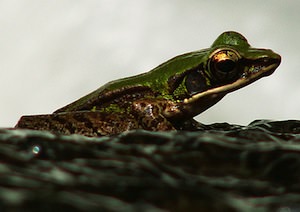Are You Ready to Kiss Frogs Goodbye?
The first ever analysis of the rate of population loss among frogs, toads, salamanders and newts found a general decline of 3.7 percent per year from 2002 to 2011, while "red-listed" species disappeared at a rate of 11.6 percent annually, even in protected lands.
The first ever analysis of the rate of population loss among frogs, toads, salamanders and newts found a general decline of 3.7 percent per year from 2002 to 2011, while “red-listed” species disappeared at a rate of 11.6 percent annually, even in protected lands.
That study didn’t address causes, but another paper predictably identified human-induced habitat destruction, environmental contamination, invasive species and climate change among the culprits.
— Posted by Alexander Reed Kelly.
Your support matters…Julia Whitty at Mother Jones:
“An enormous rate of change has occurred in the last 100 years, and amphibians are not evolving fast enough to keep up with it,” says Andrew Blaustein, author of the 2011 paper in the Annals of the New York Academy of Sciences, and professor of zoology at Oregon State University. “With a permeable skin and exposure to both aquatic and terrestrial problems, amphibians face a double whammy. Because of this, mammals, fish and birds have not experienced population impacts as severely as amphibians—at least, not yet.”
“Amphibians have been a constant presence in our planet’s ponds, streams, lakes and rivers for 350 million years or so, surviving countless changes that caused many other groups of animals to go extinct,” says USGS Director Suzette Kimball. “This is why the findings of this study are so noteworthy; they demonstrate that the pressures amphibians now face exceed the ability of many of these survivors to cope.”
Independent journalism is under threat and overshadowed by heavily funded mainstream media.
You can help level the playing field. Become a member.
Your tax-deductible contribution keeps us digging beneath the headlines to give you thought-provoking, investigative reporting and analysis that unearths what's really happening- without compromise.
Give today to support our courageous, independent journalists.






You need to be a supporter to comment.
There are currently no responses to this article.
Be the first to respond.